Category Archives: AOA News Letter
7TH BRAND AMBASSADOR PROGRAM AT IBA UNIVERSITY KARACHI.
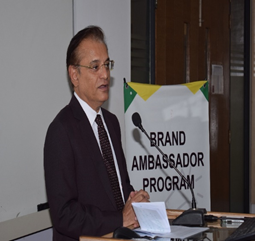
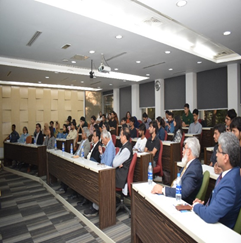
A workshop on the Ambassador Program was held on 24 November 2025 at IBA University Karachi.
Ms. Maheen Ghauri, Dean, Student Affairs and International Student Engagement Office of Student Affairs welcomed the participants and shared that the Ambassador Program is an excellent initiative to encourage youth participation in civic responsibilities. She emphasized that this collaboration will further strengthen the relationship between IBA University and the office of Provincial Ombudsman Sindh.
Addressing the students, Mr. Sohail Rajput highlighted that the program engages university students across Sindh to raise awareness about the role of the Ombudsman in promoting good governance, transparency, and human rights. He stated that IBA University Karachi is the seventh institution to join this initiative.
He explained the key features of the Brand Ambassador Program, launched initially through the Regional Subsidy of IOI, which aims to Disseminate information about the role and functions of the Ombudsman, promote civic responsibility among students and Enhance community outreach through student-led activities and social media
He added that the selected ambassadors will serve as a vital link between the Provincial Ombudsman Sindh and the public, helping to promote good governance and strengthening communication between the Ombudsman’s office, students, and the wider community.
Ms. Rehana G. Ali Memon, Advisor, and Mr. Masood Ishrat, Registrar Secretariat, Provincial Ombudsman Sindh, also briefed the participants on the concept of the Ambassador Program and the functioning of the office of Provincial Ombudsman Sindh. Their detailed presentation was followed by an interactive question-and-answer session to address the participants’ queries.
THE HEAD OF THE OFFICE OF THE OMBUDSPERSON PARTICIPATED IN THE IOI REGIONAL MEETING AND INTERNATIONAL CONFERENCE.
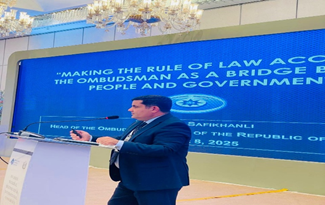
The Head of the Ombudsperson’s Office, Aydin Safikhanli, participated in the Asian Regional Meeting and the IOI international conference on “Strengthening the Rule of Law through Ombudsman Institution” held in Lahore, Pakistan.
During the conference’s session titled “Making the Rule of Law Accessible: The Ombudsman as a Bridge between People and Government,” the head of the Office said that ombudsmen and NHRIs played significant role in the promotion of the rule of law. It was noted that the establishment of the ombuds institution of Azerbaijan was one of the important steps in the field of protecting human rights and ensuring the rule of law.
The head of the Office broadly informed the participants about the ombudsperson’s activity in the field of protection of human rights and freedoms, including work as a national preventive mechanism against torture, for the protection of the right to information, promotion, protection, and ensuring the rights of persons with disabilities and children, and as an independent monitoring mechanism for ensuring the right to equality and non-discrimination.
Aydin Safikhanli said that the cooperation with international organizations is very important for the Ombudsperson, and the efforts made in this direction were indicated in the ENNHRI’s Rule of Law Report as best practice.
Furthermore, it was noted that although international armed conflicts should be resolved based on international law and the principle of respect for the law, Azerbaijan, in the long term, was faced with injustice and double standards; its territores were occupied, and the fundamental rights of over one million people have been violated. As a result of the Patriotic War, Azerbaijan restored its territorial integrity and sovereignty, and reinstated the violated rights of its more than one million people, as well as facilitated the implementation of the relevant decisions of the international organizations, and that, currently, important actions are being taken to ensure the peace in the region.
The Head of the Office also spoke about the fact-finding missions carried out by the Ombudsperson in the liberated areas during the wartime and post-conflict period and international FFM reports prepared on the basis of findings and sent to international institutions, ombudspersons, and NHRIs of other countries.
ACRC AND PUBLIC PROCUREMENT SERVICE JOIN HANDS TO CREATE A FAIR AND TRANSPARENT PUBLIC PROCUREMENT MARKET.
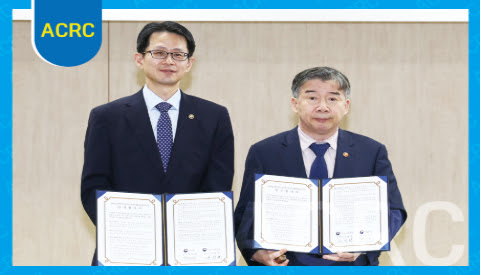
– ACRC signed an MOU with Public Procurement Service on Oct. 2 to spread a culture of integrity in public procurement market
The Anti-Corruption and Civil Rights Commission (ACRC, Chairperson Ryu Chul Whan) signed an MOU on Oct. 2 with the Public Procurement Service (Administrator Baek Seung-bo) at the PPS main conference room, Government Daejeon Complex Building 3, to establish an integrity-driven public procurement market and enhance integrity of private procurement companies.
The two agencies jointly pursued the MOU to improve fairness and transparency in the public procurement market by mutual cooperation on: supporting integrity training for private procurement companies; sharing and promoting anti-corruption and integrity policies; encouraging and spreading voluntary implementation of ethical management by procurement firms; and identifying improvement tasks to entrench an integrity culture in public procurement.
In particular, when each agency conducts training programs related to contract, they will provide each other with expert instructors, thereby ensuring the professionalism of integrity training for procurement companies while simultaneously improving contract-related practical skills and anti-corruption capabilities of officers in charge of contract affairs.
<Examples of mutual support for professional instructors for training programs between ACRC and PPS>
■ (Led by ACRC) Courses to enhance anti-corruption capabilities of contract officers (for public officials) ⇨ PPS provides professional instructors
■ (Led by PPS) Three courses including practical training on multiple-supplier contracts (for private procurement companies) ⇨ ACRC provides instructors with expertise
ACRC Chairperson Ryu Chul Whan said, “Through this MOU, I expect a synergistic effect in enhancing the fairness and transparency of the public procurement market by linking the ACRC’s various anti-corruption policies and activities with procurement operations.
OMBUDSMAN COMMENDS EFFORTS TO FOSTER ADMINISTRATIVE INNOVATION AND GOOD GOVERNANCE AND CALLS ON PUBLIC TO VOTE IN LEGISLATIVE COUNCIL GENERAL ELECTION.
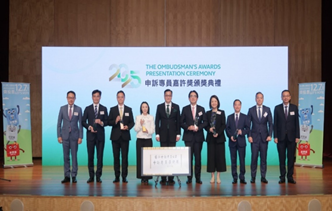
At the 28th Presentation Ceremony of The Ombudsman’s Awards today (18 November), the Ombudsman, Mr. Jack Chan, presented the Gold, Silver and Bronze Awards for Public Organisations to the Housing Department (“HD”), the Food and Environmental Hygiene Department (“FEHD”), and the Correctional Services Department (“CSD”), respectively. He also honoured the Transport Department (“TD”) with the Award on Mediation, the Drainage Services Department (“DSD”) with the Information Technology Application and Creativity Award, and the Digital Policy Office (“DPO”) with the Customer Services Award. Additionally, 10 teams were recognised with the Team Awards, and 80 public officers received the Individual Awards.
Addressing the ceremony, Mr. Chan shared the Office of The Ombudsman’s record-breaking accomplishments across all three strategic focuses he introduced last year, and extended his sincere appreciation to all relevant government departments and public organisations for their active co-operation and collaboration. This year, following the completion of several direct investigation operations into livelihood issues, which have drawn widespread public concern and significant attention from the Government, the Office is poised to surpass last year’s achievements. Furthermore, it will actively leverage the Hong Kong International Ombudsman Academy to foster innovation and drive positive changes in public administration, advocate the concept of “maladministration prevention”, and continue to strengthen ties and exchanges with international ombudsman bodies. These initiatives aim to showcase the Hong Kong Special Administrative Region (“HKSAR”)’s distinctive advantage of having strong support from the motherland and close connection with the world while telling good stories of Hong Kong.
HD received the Gold Award this year. Despite its heavy workload in handling public rental housing applications, tenancy matters and estate management, HD has been earnest in responding to the Office’s inquiries. Its efficient staff have contributed a lot to many successful mediation cases, demonstrating a strong commitment to service. HD has shown particular concern for cases involving the elderly and people in need, working closely with the Office to resolve public concerns promptly and effectively. These efforts reflect its people-oriented approach and unwavering commitment to enhancing public administration.
FEHD was recognised for its outstanding performance in food safety, environmental hygiene and public health. It responds promptly to public complaints and actively implements the Office’s recommendations for improvement. FEHD also takes the initiative to participate in the Office’s mediation efforts, striving to resolve public complaints more swiftly and effectively. Moreover, it has embraced innovative technologies to enhance service efficiency, illustrating a positive and forward-looking service mindset.
CSD has proactively introduced innovative initiatives, including a chatbot and the Approved Hand-in Articles e-Ordering Service, to enhance penal management and convenience for the public. It also offers a diverse range of rehabilitation and education programmes to support persons in custody and rehabilitated individuals in reintegrating into society. CSD adopts a proactive and positive approach to complaint handling, delivering comprehensive and timely responses, which is commendable.
TD, recipient of the Award on Mediation this year, resolved 74 cases by mediation in 2024-25. Its staff responded promptly and communicated clearly, exemplifying a balanced approach that is lawful, practical and empathetic throughout the mediation process. Such practices led to satisfactory resolutions and earned the TD high praise from the Office for its exemplary performance in promoting mediation.
DSD was honoured with the Information Technology Application and Creativity Award for its dedicated in-house development of smart drainage systems to address challenges posed by extreme weather. Among its notable achievements, the Mosaic Model Map effectively predicts the flood risks of all districts throughout the territory, thereby enhancing emergency response capabilities. The system was recognised at the 50th International Exhibition of Inventions of Geneva this year, underscoring the DSD’s excellence in technology application and creativity.
DPO received the Customer Services Award. Operated by DPO, the 1823 Contact Centre provides 24-hour customer service. Last year, it processed 7.55 million cases using artificial intelligence and excelled itself across all key performance indicators. 1823 has actively adopted innovative technologies to further streamline service workflows and is committed to delivering professional, courteous and efficient service at all times.
This year, the Office introduced a new Team Award to not only recognise professional teams that have demonstrated excellence in enhancing public administration but also foster stronger connection and team spirit. A total of 10 teams received the Team Awards, including three involving interdepartmental collaboration. In addition, the Individual Awards were presented to 80 distinguished public officers. At the ceremony, Mr Chan praised the awardees, saying, “I am very pleased to see more public officers being commended. This is both a testament to their efforts and contributions and a showcase for continuous progress in public services.”
In his final remarks, Mr. Chan underscored the significance of the eighth Legislative Council General Election, noting its pivotal role in supporting the HKSAR Government’s actions in policy formulation and implementation and driving economic development and improvement of people’s livelihood. He stressed that as the independent watchdog, the Ombudsman is obliged to communicate an important message to 106 departments and organisations subject to the Office’s jurisdiction: Public officers, as the backbone of the governance team, should set an example and cast votes in the elections to fulfil their civic responsibility. The Ombudsman and all his staff fully support the election. He urged all members of the public to support the election wholeheartedly and all voters to vote on 7 December. He also wished that every colleague present would motivate their families and friends to fulfil their civic responsibility by casting a precious vote for the HKSAR’s good governance, economic vibrancy and public well-being, as well as the full implementation of the principle of “patriots administering Hong Kong”. Mr. Chan expressed his sincere appreciation to all winning organisations and public officers for their united efforts in advancing the quality of public administration.
FEDERAL OMBUDSMAN ADDRESSES INTERNATIONAL CONFERENCE ON CONSTITUTION AND THE RULE OF LAW IN AZERBAIJAN.

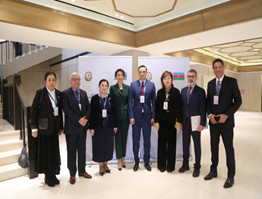
- Federal Ombudsman addresses international conference on constitution and the rule of law in Azerbaijan.
- Highlights centrality of the rule of law in promoting good governance and inclusivity.
- Calls for greater cooperation to strengthen ombudsman institutions.
Baku (Azerbaijan): 12 November 2025 – The Wafaqi Mohtasib (Federal Ombudsman) and President of the Asian Ombudsman Association (AOA), Mr. Ejaz Ahmad Qureshi, has said that the ombuds fraternity is globally contributing towards promoting and protecting human rights, civil liberties, good governance and the rule of law. He was addressing an ‘International Conference on Constitution and the Rule of Law in Contemporary Legal Systems’, organized as part of the ‘Year of Constitution and Sovereignty’ celebrations of the Republic of Azerbaijan, here today.
The Federal Ombudsman said that ombudsmanship is aimed at making the state institutions more vibrant, effective and efficient, thereby, improving their service delivery in accordance with the law of the land. The ombuds institutions, he said, serves as enablers which promote transparency, accountability, equality, fair and just practices. Mr. Qureshi highlighted the centrality of rule of law in promoting good governance and protecting the citizen’s rights and said that people are the ultimate stakeholders and their well-being remains supreme in any democratic dispensation.
Mr. Qureshi warmly felicitated the government and the people of Republic of Azerbaijan on the
30th anniversary of the adoption of the constitution and the 5th anniversary of the restoration of sovereignty and said that both events are important milestones in the country’s history. He added that Pakistan and Azerbaijan enjoyed close and fraternal relations which are rooted deep in history, religion and culture. He expressed the confidence that these ties would grow further in the days to come and the ombudsman institutions in both countries would continue to work together in promoting good governance, the rule of law and inclusivity.
The international conference was attended by the Chairman of the Constitutional Court of the Republic of Azerbaijan and heads of various Ombudsman and Judicial institutions in the Asian region.
ANNUAL REPORTS OF THE OMBUDSMAN INSTITUTION FOR 2023 AND 2024 DISCUSSED IN THE GRAND NATIONAL ASSEMBLY OF TÜRKIYE (GNAT).
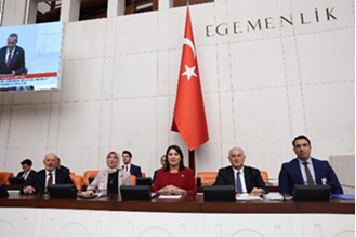
During the Plenary Session of the Grand National Assembly of Türkiye (GNAT) on 2 October 2025, the Joint Committee, which consists of the members of the Petition Committee and the Human Rights Inquiry Committee, discussed the 2023 and 2024 Annual Reports of the Ombudsman Institution. Chief Ombudsman Mr. Mehmet Akarca, Ombudsmen Mr. Ertunç Erkan Balta, Ms. Fatma Benli Yalçın, Mr. Abdullah Cengiz Makas, Mr. Özcan Yıldız, and Secretary General Mr. Mehmet Doğan attended the session.
CHIEF OMBUDSMAN OF TURKIYE, ATTENDS THE 10TH MEETING OF THE EURASIAN OMBUDSMAN ALLIANCE.
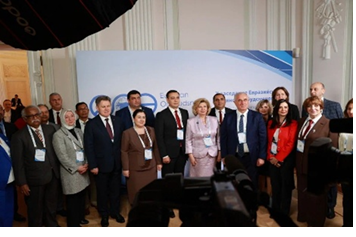
Chief Ombudsman of Türkiye, Mr. Mehmet Akarca, paid an official visit to Moscow upon the invitation of Ms. Tatiana Moskalkova, the High Commissioner for Human Rights in the Russian Federation, in order to participate in the 10th Meeting of the Eurasian Ombudsman Alliance as an obverver, on the theme “Protection of the Rights of Residents of Hard-to-Reach, Remote, and Rural Areas”; as well as the 9th International Scientific and Practical Conference on “Protection of Human Rights in the Context of the Digitalization of Society.” Ombudsperson Ms. Fatma Benli Yalçın accompanied Mr. Akarca during the visit.
At the 10th Meeting of the Eurasian Ombudsman Alliance (EOA), Mr. Akarca stated that “Human rights and justice are for everyone. Just as we embrace the principle of equality in public services, we must aim to reach all citizens in the conduct of our activities.” He emphasized that the Ombudsman Institution of Türkiye frequently organizes regional meetings to reach citizens in different provinces across the country, which has a vast geography and population. He noted that the Institution prints informative brochures about its work and ensures they are distributed in different provinces and at various service points to raise public awareness. He added that the Ombudsman Institution frequently appears in visual and print media, provides information about its activities and shares important decisions that concern society at large.
PUBLIC DEFENDER’S 11TH REGIONAL OFFICE OPENED IN DUSHETI.
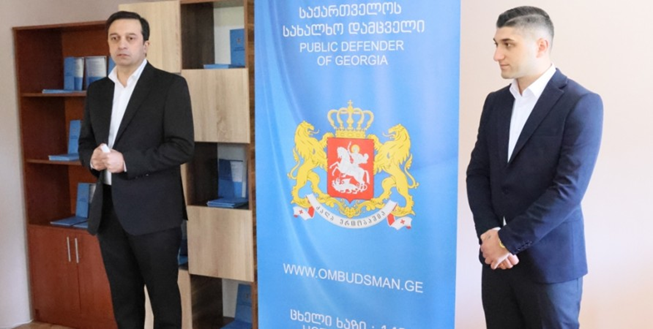
On October 21, 2025, the Public Defender of Georgia, Levan Ioseliani, opened the 11th Regional Office in the Dusheti municipality, Mtskheta-Mtianeti region.
The human rights situation in the region and the activities of the Public Defender to protect and promote the rights and freedoms of the population living in Mtskheta-Mtianeti were the topics discussed at the event.
The opening was attended by self-government officials, newly elected mayors, representatives of state agencies and local civil society organizations.
At this stage, the Public Defender of Georgia has regional offices in 11 cities. The Mtskheta-Mtianeti office is located on 19B Agmashenebeli St. in Dusheti and will cover the municipalities of Mtskheta, Mtianeti, Dusheti, Kazbegi and Akhalgori. Jemal Bortsvadze will be the Public Defender’s representative in the office.
Information about the regional offices can be found on the Public Defender’s website www.ombudsman.ge.
OMBUDSMAN PARTICIPATES IN THE INTERNATIONAL HUMAN RIGHTS CONFERENCE IN WARSAW.
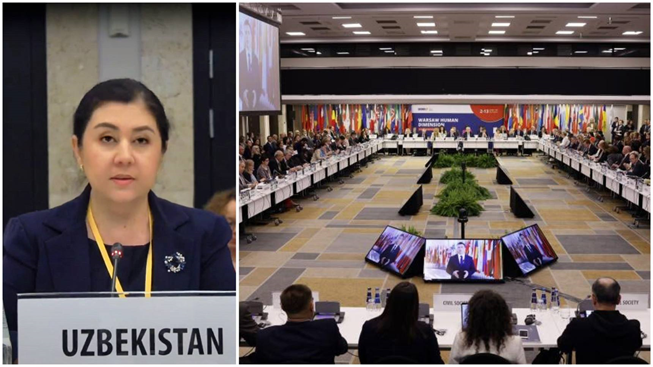
As reported earlier, on October 6, 2025, the traditional “Warsaw Human Dimension Conference 2025” organized by the Organization for Security and Co-operation in Europe (OSCE) commenced its work in Warsaw, Republic of Poland. The event is dedicated to issues of the human dimension.
This is the largest OSCE human rights forum, bringing together representatives of 57 participating States, including the Republic of Uzbekistan, as well as OSCE institutions, national human rights organizations, civil society representatives, and international experts.
The conference discusses issues related to human rights, the rule of law, freedom of expression, gender equality, prevention of torture, the exchange of best practices of national institutions, and strengthening cooperation among countries.
On October 9, during the next plenary meeting — Session 4 on the topic “Rule of Law: Prevention and Eradication of Torture and Other Cruel, Inhuman or Degrading Treatment or Punishment” — the Commissioner of the Oliy Majlis of the Republic of Uzbekistan for Human Rights (Ombudsman), Feruza Eshmatova, delivered a presentation. In her speech, she emphasized Uzbekistan’s firm stance against torture and highlighted the importance of monitoring visits to penitentiary institutions carried out jointly with public groups established in accordance with the decision of the Head of State.
During this session, representatives of OSCE participating states and National Human Rights institutions exchanged views on preventing torture, enhancing the effectiveness of national preventive mechanisms, and ensuring transparency and accountability in the operation of penal institutions.
The Warsaw Conference serves as an important platform for effective dialogue between states and civil society institutions in the field of human rights, comparison of national practices, and the implementation of international standards.
The conference will continue until October 17 of this year.
STRENGTHENING COLLABORATION THROUGH KNOWLEDGE SHARING AND INNOVATION.
HELPLINE 150
Following the successful conclusion of the IOI Asian Regional Meeting and International Conference 2025 in Lahore, the Office of the Ombudsman Punjab had the honour of hosting distinguished delegates from Azerbaijan, Timor-Leste, the Philippines, and Indonesia at its Head Office in Lahore, Pakistan. The visit reflected the shared commitment of Ombudsman institutions to deepen cooperation, exchange expertise, and strengthen citizen-service mechanisms worldwide.
During the visit, the delegates were introduced to the 24/7 Helpline 1050, a flagship initiative of the Office of the Ombudsman Punjab aimed at ensuring accessible, transparent, and efficient grievance redressal for citizens across Pakistan. The helpline operates as a PRI-linked, in-house call center integrated with the Ombudsman Punjab Management Information System (OPMIS)—a centralized digital platform for real-time complaint registration, monitoring, and follow-up.
Mr. Sami Ullah, Advisor (F&P)/(ITID), delivered a comprehensive briefing on the working of the helpline. He highlighted how the helpline has become an essential bridge between citizens and public administration, with over 800 calls registered in September 2025 alone.
The visiting Ombudsmen and their teams expressed keen interest in adopting similar systems within their own offices, recognizing the model’s potential to improve accessibility and administrative accountability. The session concluded with an interactive discussion on best practices and collaborative opportunities under the IOI framework.
This engagement not only reinforced the Ombudsman Punjab’s leadership in promoting institutional innovation and citizen-centered service delivery but also exemplified the broader IOI vision of enhancing accountability, transparency, and good governance through mutual learning and collaboration among Ombudsman institutions worldwide.
